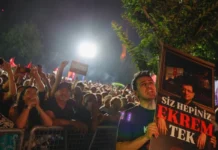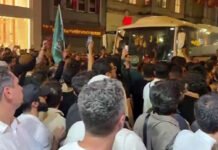The top US general in the coalition fighting the Islamic State of Iraq and the Levant (ISIL) has pledged that US troops will stay in the north Syrian town of Manbij to support their Syrian Kurdish allies, the Military Times site reports. Lt. Gen. Paul E. Funk made the remarks at a visit to US forces stationed in Manbij on Wednesday, according to the news report.
The United States’ relationship with the mainly-Kurdish People’s Protection Units (YPG) sparked a diplomatic crisis with NATO ally Turkey in January, after the announcement of a 30,000-strong border force predominantly made up of YPG fighters.
Turkey sees the YPG as the Syrian extension of the outlawed Kurdistan Workers’ Party (PKK), a terrorist-designated organisation in Turkey and the United States that has been involved in a long-running conflict with Turkish armed forces. Funk’s remarks confirm that US troops will stay in Manbij, however, meaning that the possibility remains of a direct military confrontation between the two NATO allies.
According to a report by the New York Times, two senior American generals came to the front line outside the Manbij on Wednesday flying outsized American flags on their vehicles, in case pro-Turkish forces just the other side of the no man’s land, 20 yards away, did not realize who they were.
“We’re very proud of our positions here, and we want to make sure everybody knows it,” said Maj. Gen. Jamie Jarrard, the Special Operations commander for the American-led coalition in Iraq and Syria.
If the message to Turkey was not clear already, the overall coalition commander accompanying General Jarrard, Lt. Gen. Paul Funk, elaborated. “You hit us, we will respond aggressively. We will defend ourselves.”
The trip was the first by such senior United States military officers to the front in northern Syria since Turkish autocratic President Recep Tayyip Erdoğan threatened to attack the city of Manbij, calling it a bastion of terrorists and demanding that American forces leave. But the Americans have refused, creating the potential for an unprecedented armed conflict between two NATO allies, the United States and Turkey — the latest twist on the seven-year-old war in Syria.
The New York Times wrote that the American support for Manbij has particularly alarmed Turkey. It is waging a military campaign to take the Kurdish-held city of Afrin, 80 miles west, while pursuing an unusually outspoken public relations campaign to threaten Manbij and make the Americans depart, so that Syrian militias aligned with Turkish forces can take it from America’s Kurdish-led allies.
The Turks say the Manbij Military Council is just the YPG in disguise. The Americans and Kurds say the council is allied with the Kurdish-dominated Syrian Democratic Forces, but most of its fighters are local Arabs. The American military has sought to persuade Turkey that the Manbij forces are reliable allies, and important in the fight against ISIL elsewhere. Previously, the Americans hosted meetings between Turkish military officers and Manbij officers to try to convince them, but those meetings ceased this year. General Funk said the Turks had declined an invitation to Manbij this year.
The paper said, the Americans have vowed to stay in Manbij and support their allies. But the American forces in Manbij number only a few hundred out of a total of 2,000 in all of northern Syria, mostly Special Operations troops. The Turks and their allied militias, the Free Syrian Army fighting around Afrin, are estimated at 20,000 in all. Both Turks and Americans have substantial air forces in the area.
Even if the Turks do not carry out their threats, the fight in Afrin has indirectly hurt the American-led fight against ISIL. As the Syrian Democratic Forces shift fighters to the battle in Afrin, they have weakened the ISIL campaign far to the east. “It’s illogical that while we are fighting ISIL, the enemy of the world, over there, the Turks attack us in Afrin,” said Shervan Derwish, the spokesman for the Manbij Military Council. “Our fight against ISIL has had to be minimized as we reduce our power there to defend Afrin.”
“I think our main concern is that anything that disrupts everybody’s focus on ISIS and eliminating the complete physical caliphate — and we’re close, we’re very close — something people couldn’t have imagined a year ago — anything that disrupts us or takes our eye off that prize, is not good,” General Jarrard said.
General Funk said the Americans prefer to “maintain focus on the enemy in front of you and mow him down — that’s much easier than having to look in multiple directions.”
“There are a lot of people that do equate them with the PKK, but I have not seen any indication of that in my dealings with them throughout our relationship,” General Jarrard said.
General Funk, a veteran of Iraq and other deployments, said Syria had been “delightful” by comparison. “People are trying to get back to their normal way of living,” he said. “As long as people keep working together on that local governance and local control, I see hope.”















